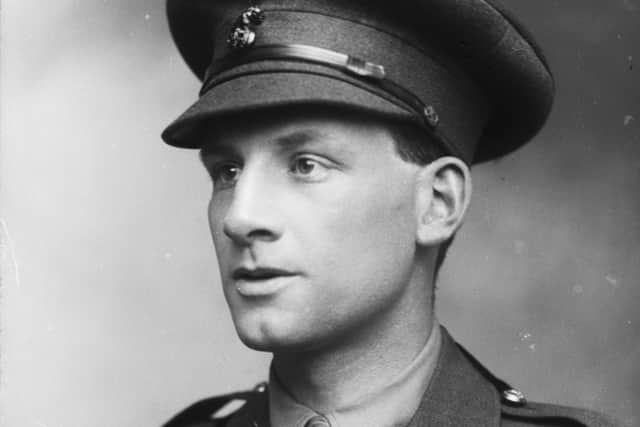Book review: Soldiers Don’t Go Mad, by Charles Glass
This is a magnificent and moving book, the First World War story of Craiglockhart Hospital in Edinburgh and the treatment there of shell-shocked officers, the two most famous being the finest English poets of the war, Siegfried Sassoon and Wilfred Owen. The title comes from a Sassoon poem, the following lines being “unless they lose control of ugly thoughts / That drive them out to jabber among the trees”.
I should declare an interest. Charles Glass is a friend of mine, someone I both admire and like. An experienced American wat correspondent, he endured years ago months of imprisonment, held as a hostage in Beirut by Islamist terrorists before escaping. He didn’t go mad and jabber to the trees, but the ordeal coupled with his reporting experience gives him a rare understanding of mental strain.
Advertisement
Hide AdThe British Army in the early years of the Great War was reluctant to admit the reality of shell shock. The chapters devoted here to the horrors of trench warfare on the Western Front are so appalling that this reluctance is grotesque. When the military establishment eventually conceded that shell shock was real, officers were sent to Craiglockhart, a pre-war spa converted into a hospital, to be treated. The aim was to get the patients well enough to return to the front. About half of those treated at Craiglockhart did so. Others were deemed fit only for home service, and others discharged as incurable.


The consultants, Dr Brock and Dr Rivers, had different approaches. Brock believed in a work cure, his patients labouring in the garden and hospital grounds, while Rivers, a Freudian who had studied in Vienna, believed in a talking cure. Sassoon and Owen were among his patients.
They came from very different backgrounds, Owen, the younger by seven years from a lower middle-class family, Sassoon from a very rich Jewish one. Both had served in the infantry, Sassoon with spectacular success, recklessly brave, known to his men as “Mad Jack” on account of his reckless exploits in no man’s land which had earned him the Military Cross, Owen known only to his family and platoon. But they had much in common; both were poets, though Owen had published nothing yet, both were homosexually inclined, and both were ridiculously brave.
Yet they were at Craiglockhart for different reasons. Owen was suffering severely from shell shock. He responded to Rivers and to the life at Craiglockhart eagerly, playing a full part in the life of the hospital, acting in plays, editing the in-house magazine, while also making friends with an artistic coterie in Stockbridge and working on his own poems, with advice and encouragement from Sassoon.
Sassoon wasn’t shell shocked, at least in his own view. He was there because he was an embarrassment, a serving officer and hero who had turned against the war and published a demand for an armistice and negotiated peace. This was conduct which invited a court-martial. This would have embarrassed the War Office and the High Command. Friends, among them their fellow-poet Robert Graves, intervened; if Sassoon wasn’t admitting to shell shock, he was nevertheless mentally disturbed. So he was sent to Craiglockhart, and entrusted to Rivers, who, as a serving officer, worked to change Sassoon’s view of the war and of his duty, even though by this time he was having doubts himself. Unlike Owen, to my mind the more sympathetic of the two, Sassoon played very little part in the life of the hospital; he didn’t think he belonged there and spent much of his time playing golf. But he befriended Owen, and his encouragement and advice helped the younger man’s development as a poet.
Both returned to the front, Sassoon reckless as ever, Owen brave and diligent in his care for his men. He was killed five days before the Armistice, and was also awarded the Military Cross, posthumously in his case.
Advertisement
Hide AdCharles Glass does full justice to the horror of that war in which, as Owen wrote, men died as cattle, and also to the Edinburgh where Owen found interest, sympathy and comfort. But the last word should go to Sassoon:
“Soldiers conceal their hatred of war / Civilians conceal their liking for it” – bitter lines to which one can add only this; it would be different in the next encounter, when war was made on civilians too, as it is again today.
Soldiers Don’t Go Mad, by Charles Glass, Bedford Square, £22